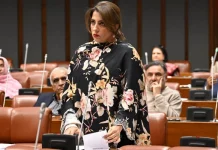
By Ajmal Khan
ISLAMABAD: The Foreign Office on Tuesday rejected a statement by Indian army chief Gen Bipin Rawat, in which he had claimed that a terrorist camp in Balakot had been “reactivated”.
“Indian allegations that Pakistan is [trying to] infiltrate [the border] are an attempt to divert the international community’s attention from the grave violations in occupied Kashmir,” said a statement released by the Foreign Office spokesperson Dr Mohammad Faisal.
In February this year, Indian government had said that its air force had killed “a very large number” of militants in Pakistan and destroyed a terrorist camp run by banned outfit Jaish-e-Mohammad in Balakot by carrying out airstrikes.
India had said the camp hosted members of a militant group responsible for a suicide car bombing in occupied Kashmir’s Pulwama that killed 40 Indian paramilitary soldiers.
Pakistan had denied the strike was carried out from its soil. It also said no such camps were hit or operated in the area. The next day, Pakistan Air Force shot down two Indian fighter jets during an aerial confrontation and took an Indian pilot prisoner. He was later released.
India’s claims were also called into question by locals
and foreign media, which reported that the warplanes had managed to destroy a few trees.
Yesterday, the Indian army chief said that the camp in Balakot had been “reactivated” and that 500 terrorists were “moving” towards India.
“Balakot has been reactivated. Balakot was affected, damaged and destroyed. The action had been taken by the Indian Air Force and now they are reactivated,” Gen Rawat was reported as saying by the Indian media. “We have a minimum number of 500 people. Depending on the weather pattern they keep moving. As the temperature keeps falling, they move. Figures keep fluctuating depending on where terrorists are. We have taken measures and put in more troops along Line of Control.”
He did not provide any evidence to back his claims.
In the statement released by the Foreign Office today, Dr Faisal said: “Indian statements and measures are a threat to regional peace and stability.
“India will not succeed in misleading the international community by using these negative tactics.”
Pak Army warns India against ‘misadventure’
The Indian army chief’s claim was also rubbished by the Pakistan Army, with the military’s media wing terming the allegation of infiltration as a “pretext for a false flag operation” by India.
“Irresponsible statements by Indian military commanders particularly about AJ&K are expression of their frustration due to their failure to handle [the] situation in IOJ&K (Indian-occupied Jammu and Kashmir) and attempts to divert world’s attention from Indian state terrorism and siege of IOJ&K,” a tweet by the director general of Inter-Services Public Relations (ISPR) said.
It said India’s accusations of infiltration or the presence of alleged terrorist camps in Pakistan are “pretext for a false flag operation/misadventure which if tried shall have serious consequences for regional peace”.
“Pak Armed Forces are fully prepared to respond to any aggression/misadventure regardless of cost,” another tweet said.
Claims about UNHRC meeting ‘based on lies’
The Foreign Office also denied Indian claims on social media that Pakistan failed to garner sufficient support for its stance on occupied Kashmir in the United States Human Rights Council (UNHRC), saying that the reports are “contrary to facts and based on lies”.
The statement by Dr Faisal said that Pakistan had “successfully highlighted in Geneva the ongoing human rights violations and aggression by the Indian forces in occupied Kashmir”. The spokesperson added that no voting had been held in the UNHCR session.
“More than 50 countries demanded India to lift the curfew and end the lockdown [in occupied Kashmir] during the UNHCR session,” the statement said. “The Kashmir issue was discussed in the UNHCR session due to Pakistan’s efforts.”
Earlier this month, Foreign Minister Shah Mahmood Qureshi drew the international community’s attention towards the situation in Indian-occupied Kashmir — which has been under a strict government-imposed lockdown for more than 40 days — during 42nd session of the UNHCR session in Geneva.
Pakistan is expected to present a resolution to the council for consideration by the end of the 42nd session on September 27.
Multiple Indian media outlets, however, claimed that Pakistan had missed the deadline to file a resolution because it could not garner enough support from other countries.
Prime Minister Imran Khan, who is currently in New York, has called for the lifting of the curfew in occupied Kashmir, saying he will continue to highlight the Kashmir issue at every forum and will fulfill his promise of being the “ambassador of Kashmir”.
He is due to face Indian Prime Minister Narendra Modi during the upcoming meeting of the UN General Assembly amid their worst tensions in years over Kashmir.
Agencies add: Director General Inter-Services Public Relations (ISPR) Major General Asif Ghafoor said on Tuesday the statement by the Indian army chief regarding alleged terrorist camps in Balakot were a pretext for a false flag operation.
In a series of posts on Twitter, DG ISPR said, “Irresponsible statements by Indian military commanders particularly about AJ&K are expression of their frustration due to their failure to handle situation in IOJ&K and attempts to divert world’s attention from Indian state terrorism and siege of IOJ&K,”
“Accusations of infiltration/presence of alleged terrorists camps are pretext for a false flag operation/misadventure which if tried shall have serious consequences for regional peace,” DG ISPR said.
He added Pakistan Armed Forces are fully prepared to respond to any aggression or misadventure regardless of cost.
A day earlier, Indian Army Chief Bipin Rawat had alleged “reactivation of terror camp” in Balakot.
Islamabad had rejected the statement and said India would not succeed in hiding state terrorism in occupied Kashmir by levelling allegations against Pakistan.
“The Indian allegations of “infiltration” from Pakistan reflect a desperate attempt to divert international attention from the humanitarian nightmare in occupied Kashmir being perpetrated by Indian occupation forces,” the foreign office said.



